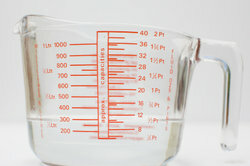Ml of water in g
In the case of water, converting milliliters ml, a unit of volume, into grams g, a weight, is quite simple. A suitable measuring cup can sometimes help with other liquids and also with granules such as flour, sugar or semolina.

Weight and volume - you should know that
- Weight and volume aren't just in that physics, but also in everyday life two different sizes with correspondingly different units of measurement. Both sizes must not be confused, even if the conversion is easy for water or water-like liquids.
- Weight is a measure of mass, i.e. the material, of an object or body and is measured in kilograms (kg) or grams (g). Weights are usually given for solid bodies.
- The volume of a body is a measure of how much space it occupies and is measured in liters (l) or milliliters (ml). Volumes are usually given for liquids or gases.
Water - this is how you convert "ml" to "g"
- Water or liquids similar to water such as juices, beer or milk are usually measured in liters or milliliters.
- On the other hand, these liquids can also be weighed, so they have a weight.
- Both quantities can easily be converted into each other: 1 g of water is 1 ml of water or 1 liter of water weighs 1 kg (under normal conditions, i.e. normal air pressure and room temperature).
- But why is it like that? The density of a substance is defined as the weight divided by the volume it occupies. As a formula d = m / V. The unit is, for example, g / cm³. For water, the density is d = 1 g / cm³ (again under normal conditions). The volume unit 1 cm³, however, corresponds to a volume of 1 ml, so that 1 g of water actually has a volume of 1 ml (see above).
Convert milliliters to grams - that's how it works
Milliliters or grams, isn't that the same thing? Do you have to convert that? She …
A measuring cup helps here
- The situation discussed applies to water, but not to other liquids such as oil or alcohols, as these have a different density. In this case, you have to convert a volume into a weight using the density or simply weigh.
- But what about flour, sugar or even oatmeal? If you don't have scales for baking, for example, a suitable measuring cup for liquids can help here. In addition to the ml information for water, these household cups also contain information for others, for the Specify the ingredients required for baking so that you can quickly and easily "weigh by volume" with this mug can. Very convenient.
How helpful do you find this article?


